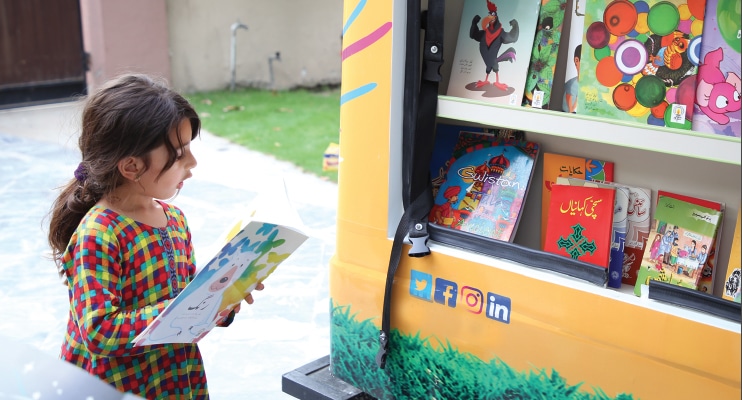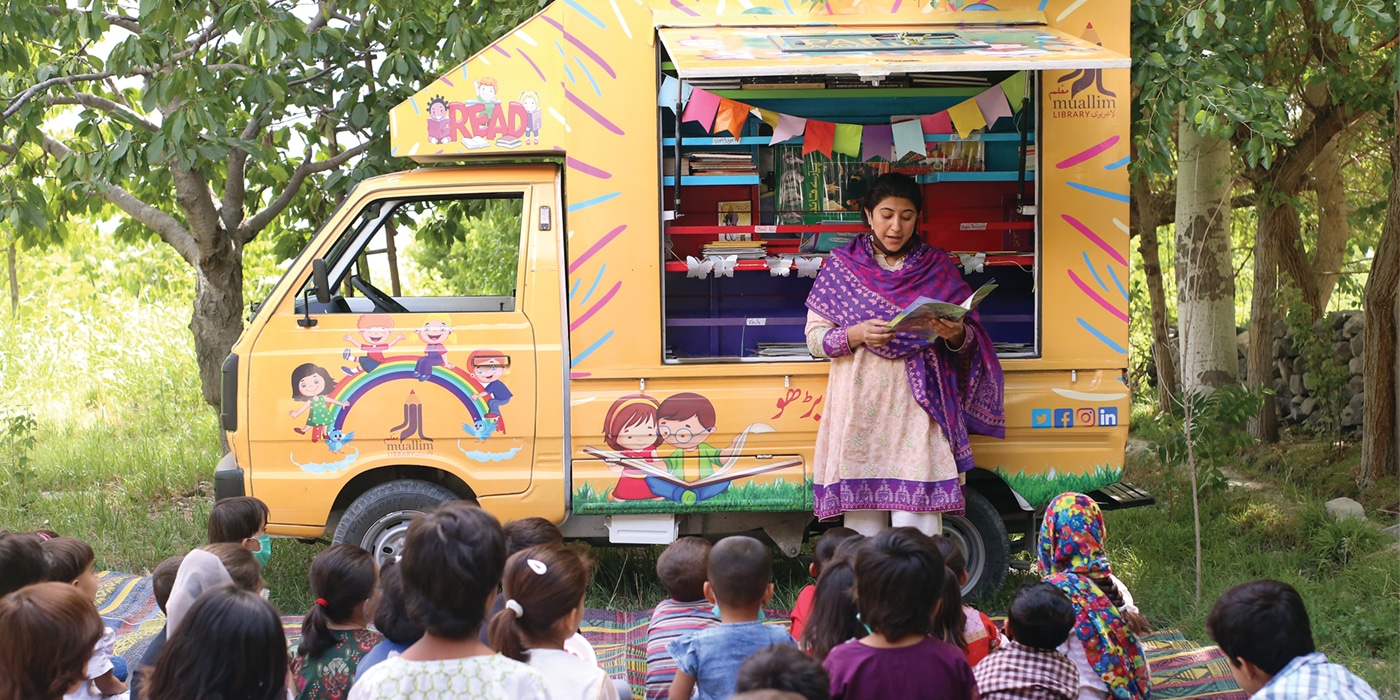For many children living in northern Pakistan, simply getting to school is the biggest barrier to getting an education. But with the introduction of an innovative library van last year, these children don’t need to travel to school. School can travel to them.
In 2020, Central Asia Institute commissioned a library van, something never before seen in this region. Stocked with hundreds of books, puppets, crafting materials, and more, the van’s purpose is to bring education and joy to children living in impoverished, isolated communities.
The van is an unusual sight as it bumps along winding country roads. Painted in bright colors, with the slogan “Read and go forward” emblazoned on its side, the van sparks the curiosity of bystanders.
“When we are driving on the road, all the communities and students are watching our van,” says Ismail Hunzai, who creates lesson plans for children and sometimes travels with the van. “And they are asking questions: ‘What is this and what are you doing here?’”
The library van is uniquely able to reach remote villages with high numbers of out-of-school youngsters. In these areas, children often want to be educated, but their families can’t afford it or there isn’t a school nearby. Low school enrollment and attendance rates are big problems for many of the towns in northern Pakistan and throughout the country.
“[Older children] might be allowed to go to school using public transportation or by walking,” explains Ms. Hira Amir, the instructor who travels with the van. “Because of this, some children only go to school three days a week [if they go at all]. But little children—girls and boys—many of them are not able to go to school because the school is too far away from their village.”

Thanks to the library van and the free classes it offers, these young children now have a chance to learn. Hira teaches them about reading, writing, math, art, critical thinking, and more. There’s even a lesson on gardening. All the exercises are interactive and encourage students to ask questions. Many are designed to bridge the gap between classroom learning and daily life.
Hira feels the lessons on nature and climate change are especially good at accomplishing this. One of her favorite books from the library talks about the importance of conservation. “Trees are our friends,” she says. “In the village, we see trees all around us. That’s why I teach [the students] to take care of trees. Trees are good for our health.”
Conservation is crucial in northern Pakistan, where farmers are clearing more and more trees to make room for farmland. There is a growing concern about deforestation and climate change throughout the country, yet the solutions and need for wild spaces are not widely talked about. (See page 28 for more information on climate change and girls’ education.)
Mr. Babar Khan, the library van project manager, speaks passionately about the need for more lessons that have real-world impacts. “Our classrooms are disconnected from our society,” he says. “Where and how will the classroom content be applied in your practical life? [This story] from the library is an example of how we can connect classroom learning and sensitize children and make [conservation] part of the social norm—to be a part of nature and not the enemy of nature. We are trying to introduce this concept to children at an early age so that it will last.”
Hira visits up to three villages a day. Throughout the month, she’ll service approximately 15 different locations, spending one to two hours in each village. Hira wishes that she could stay longer in each place, but due to the steep mountain terrain, the remote locations of the villages, and the poor quality of the roads, her drive to the next village is often long and slow.
Even though their time with the van is limited, children and adults have come to look forward with excitement to its arrival and all the treasures and joy it brings. “I am always welcomed by smiling faces,” says Hira. “And when I ask them if I can go, they always say ‘No, madam! We want more activities!’”
It’s no wonder that the communities love the library van. Few villagers have books to open their minds and imaginations to new information and ideas. And having engaging learning activities is a new concept for students in Pakistan. Teachers rarely use interactive materials like the ones Hira employs. Teaching methods have historically focused on rote memorization and preparation for end-of-semester tests. Without interactive, playful lessons, students who go to government-run or private schools are slow to grasp or retain most of what they are taught and unable to analyze information.
To get a sense of what they were up against, Ismail conducted a survey when the van program was getting started. Children were tested on their knowledge of basic concepts, like the alphabet and numbers. Most scored very low on the assessment. Ismail used what he learned to design specific activities for each village. Activities that Hira uses with students are selected based on the assessment results.
The progress they’ve witnessed has been incredible. When the children were first tested, almost none of them passed the assessment. After one year, students were retested using the same assessment. This time, approximately 80% of students passed the test. Of the 20% who didn’t, most had poor attendance or had joined the program late. The library van team is targeting these students for
special attention so they can catch up with their peers and be able to read, write, and speak English and Urdu—the two national languages—at a passable level in the next few months.
The success of the van has been so impressive that other educational organizations have taken note, and several are considering replicating the program in other parts of the country. The van could be an innovative way to provide some of Pakistan’s 22.8 million out-of-school children with a different pathway
to learning.
To increase the reach of the program, Central Asia Institute recently equipped a second library van, which will visit villages in the northeast, while the original van will continue to travel in the northwest. But even with the second van, there are still many children who remain without access to education.
Eighteen communities have contacted the library team about having the van visit their villages. In addition, people along the van’s routes will often ask the driver to make a stop at their village. But with limited time and resources, the library team cannot add additional villages to their routes at this time.
“Yesterday, we were in one village called Basseen, near Warzah, a poor area where people live in tents and don’t know about education,” explains Amir, the library van’s driver. “All the children were on the side of the road swimming in the river. I asked them ‘Why are you not going to school?’ They told me that school is very far so they cannot go to school. The girls are at home doing chores and washing clothes, so they are not able to go to school either. These children don’t even know what a pencil is. So I showed them a pencil and how to use it. They were so interested.”
When he returned to the district office at the end of the day, Amir shared this story with his boss. He hopes that one day he’ll be able to give these children the education they deserve and crave.
Until that day comes, he and the rest of the library van team are so grateful for being able to change so many lives with this project.
“Thanks deeply from the core of our hearts to the donors of CAI,” said Babar. “You provided us the opportunity to make a difference in the lives of these children. There are still children out there waiting for us to create these opportunities for them, but whatever progress we have made so far is thanks to you, the donors. We wish to convey our deepest thanks to you. We appreciate your support and trust.

